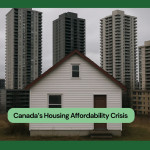Investing in real estate offers numerous avenues for building wealth, and in Canada, two popular options are condos and townhouses. Understanding the differences between these property types is crucial for making informed investment decisions.
Condominiums, or condos, are individual units within a larger complex, where owners have shared ownership of common areas such as hallways, elevators, and recreational facilities. Townhouses, on the other hand, are individual, multi-story homes that share walls with adjacent units, often resembling rows of houses. Each unit typically has its own entrance and outdoor space.
This blog explores the key differences between condos and townhouses as investment properties in Canada.
Condos vs Townhouse: which is better investment in Canada?
Here, we analyze factors such as affordability, rental income potential, maintenance responsibilities, and market trends to help investors determine which option of condos or townhouse aligns best with their financial goals.
1. Affordability and Market Trends
Condos are often more affordable than townhouses, making them accessible to a broader range of investors.
In certain markets, condos might appreciate faster due to higher demand from first-time buyers and investors, especially in urban areas.
2. Maintenance and Upkeep
Condos typically have lower maintenance responsibilities, as the condo association manages common areas and external repairs.
Townhouses require more upkeep, including landscaping and exterior maintenance, which can increase costs and time commitment.
3. Rental Income Potential
Condos can offer higher rental yields, especially in urban areas with high demand for rental properties.
Townhouses may attract tenants seeking more space and privacy, potentially leading to longer-term rental agreements.
4. Appreciation and Resale Value
Townhouses often appreciate more steadily than condos, as they are seen as a middle ground between single-family homes and condos, appealing to a broader range of buyers.
Condos can experience more volatile appreciation, influenced by factors such as market trends, location, and the overall condition of the building.
5. Location and Amenities
Condos are often located in prime urban locations, offering convenient access to amenities, public transportation, and entertainment options.
Townhouses may be situated in suburban or mixed-use areas, providing a quieter living environment with more green space.
6. Investment Risks
Condos are more susceptible to market saturation, as developers may overbuild in certain areas, leading to increased competition and potential price declines.
Townhouses, while less affected by market saturation, can be impacted by external factors such as changes in zoning laws or infrastructure development.
7. Financing and Affordability
Condos may be easier to finance, as they are often considered lower-risk investments by lenders due to shared ownership of common areas.
Townhouses, while offering more privacy and space, may require a higher down payment and stricter lending criteria.
Provincial Considerations for Condos vs Townhouses in Canadian Real Estate
In Canada, the choice between investing in a condo or a townhouse can also be influenced by provincial and city-specific factors. For example, in provinces like Ontario and British Columbia where urban centers are densely populated, condos may offer better rental income potential due to high demand from students and young professionals. On the other hand, in provinces like Alberta and Saskatchewan where suburban developments are common, townhouses may be a more lucrative investment due to their appeal to families seeking more space and privacy.
In cities like Edmonton, which is known for its affordable housing market and strong rental demand, both condos and townhouses can be attractive investments. Condos in Edmonton's downtown core may appeal to investors looking for high rental yields and potential appreciation, while townhouses in the city's suburban areas may offer a more stable rental market and lower vacancy rates. Additionally, factors such as property taxes, landlord-tenant laws, and economic trends should be considered when deciding which type of property to invest in.
Conclusion
The choice between investing in a condo or a townhouse in Canada depends on various factors, including your budget, investment goals, and risk tolerance. Both property types have their pros and cons, so it's essential to conduct thorough research and consider consulting with a real estate professional to make an informed decision.
Related posts:
Confused between new construction and resale homes in Canada for 2026? Compare costs, value, timelines, and find the best option for your budget and lifestyle.
Discover affordable ways to create a cozy Canadian home this winter. Budget décor, lighting, and DIY ideas to keep your space warm and stylish all season.


 New Construction vs Resale Homes in Canada: Which Should You Buy in 2026?
New Construction vs Resale Homes in Canada: Which Should You Buy in 2026?  How to Make Your Canadian Home Cozy on a Budget: Winter-Proof Décor Tips
How to Make Your Canadian Home Cozy on a Budget: Winter-Proof Décor Tips  5 Real Estate Investment Trends Every Canadian Investor Should Know in 2025
5 Real Estate Investment Trends Every Canadian Investor Should Know in 2025  Why Canada’s Housing Affordability Crisis Isn’t Over Yet
Why Canada’s Housing Affordability Crisis Isn’t Over Yet  Cost of Living in Edmonton (2025) - Rent, Homes & Daily Expenses
Cost of Living in Edmonton (2025) - Rent, Homes & Daily Expenses